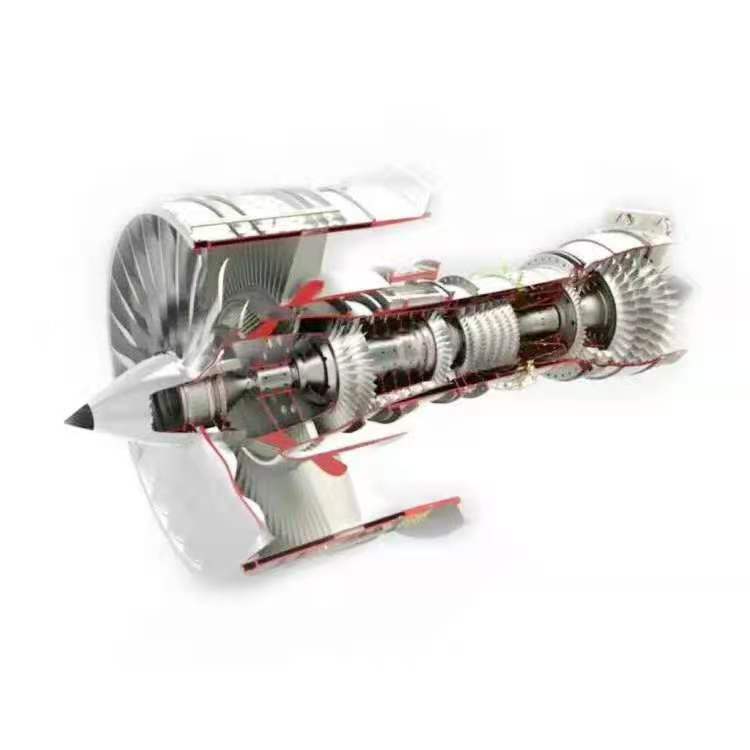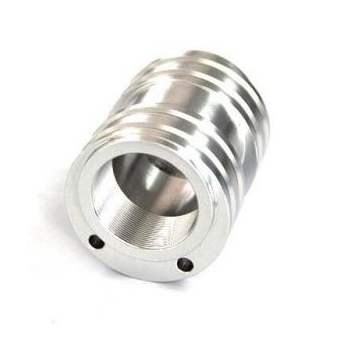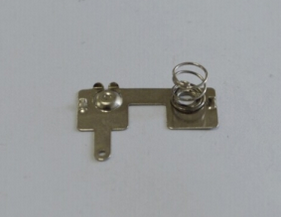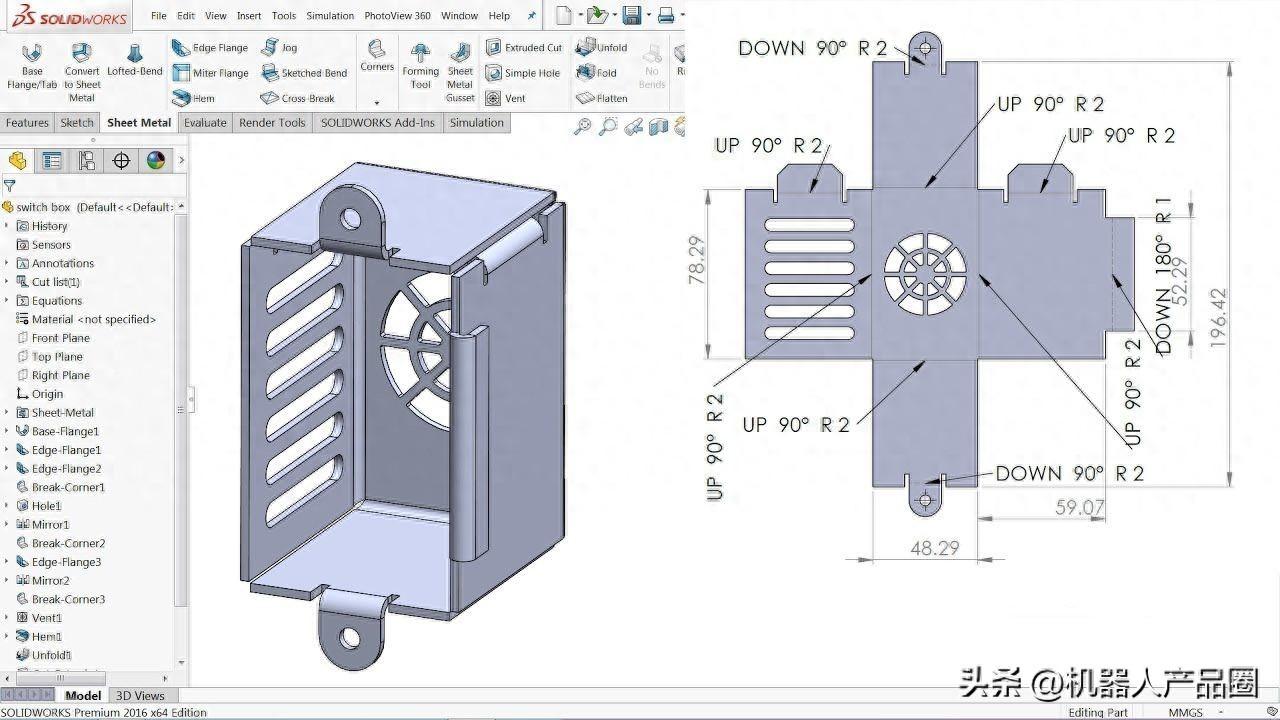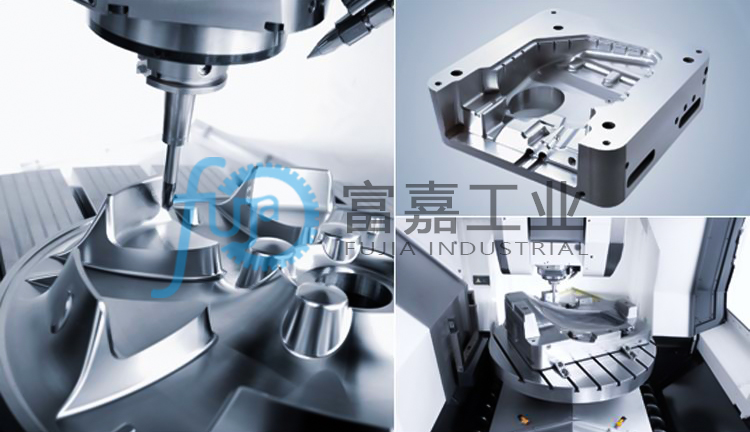In Michelangelo‘s time, good tools were chisels and hammers. While Michelangelo might have been able to create his gorgeous statue of David with a hammer and chisel, it is neither practical nor efficient for today‘s manufacturing needs. But, no matter what time period you are in, good tools are needed to bring your ideas to life. Whether you want to make a masterpiece out of marble or titanium, 5-axis machining will get you great, fast results. Just think - if Michelangelo had these machines and tools, he could have pulled out thousands of Renaissance masterpieces in no time!  Fundamental 5-axis machining with 5-axis CNC Machining refers to the use of computer numerical control (CNC) to move a cutting tool or part along five axes simultaneously. The cutting tool moves continuously along each axis so that the tool tip is always perpendicular to the part. This process allows you to machine a wide variety of complex parts. Benefits of 5-Axis CNC Machining The very favorable factors for 5-axis CNC machining are: Single Setup: 3-axis machines require multiple settings, which can lead to incorrect alignment, higher costs, and other errors. With 5-axis machining, you can machine complex shapes with a single setting, resulting in increased efficiency, time savings, lower costs, and protection from operator errors. Shorter Cutting Tools: 5-axis machining allows you to use shorter cutting tools because you can lower the cutter head and orient the tool appropriately. This helps to achieve higher cutting speeds without putting too much pressure on the cutter. Shorter cutting tools can also reduce tool vibration, which can cause cavities and cores. You‘ll see a better surface finish due to less vibration on a 5-axis machine.
Fundamental 5-axis machining with 5-axis CNC Machining refers to the use of computer numerical control (CNC) to move a cutting tool or part along five axes simultaneously. The cutting tool moves continuously along each axis so that the tool tip is always perpendicular to the part. This process allows you to machine a wide variety of complex parts. Benefits of 5-Axis CNC Machining The very favorable factors for 5-axis CNC machining are: Single Setup: 3-axis machines require multiple settings, which can lead to incorrect alignment, higher costs, and other errors. With 5-axis machining, you can machine complex shapes with a single setting, resulting in increased efficiency, time savings, lower costs, and protection from operator errors. Shorter Cutting Tools: 5-axis machining allows you to use shorter cutting tools because you can lower the cutter head and orient the tool appropriately. This helps to achieve higher cutting speeds without putting too much pressure on the cutter. Shorter cutting tools can also reduce tool vibration, which can cause cavities and cores. You‘ll see a better surface finish due to less vibration on a 5-axis machine. 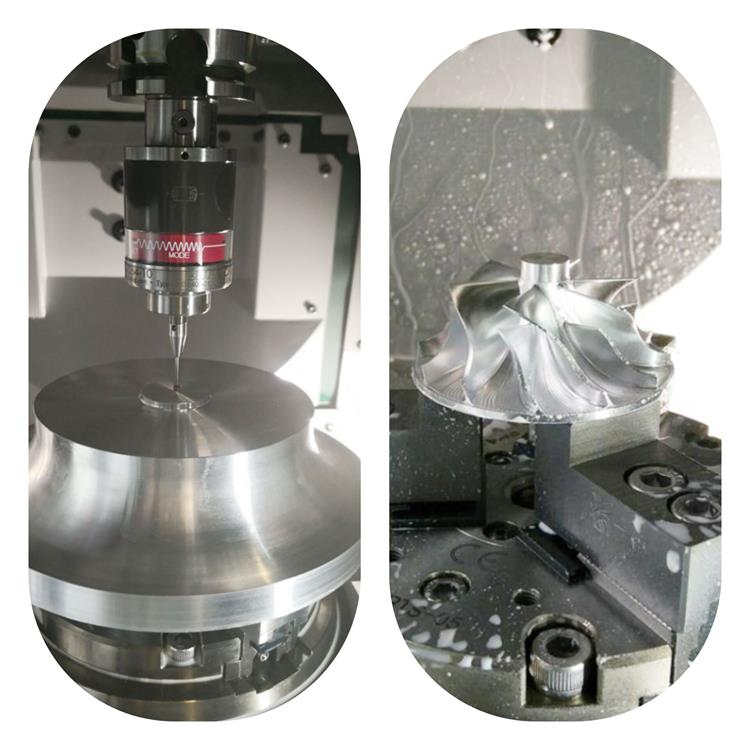 Complex Parts: This process allows you to machine complex parts that would otherwise need to be cast. If you have small batch production or prototypes, you can machine parts in weeks instead of waiting months for casting to be completed. Extended Tool Life: You can maintain a constant chip load and a good cutting position, which extends the cycle time and life of the tool. Hole Drilling: 5-axis machining allows a series of holes with various compound angles to be drilled in time. This saves a lot of time - if using a 3-axis machine, you‘ll need to use a different setting for each hole. Collision Avoidance: The ability to tilt the table or cut the tool to prevent collisions with the tool holder. Although this manufacturing process is popular in the aerospace sector, these useful properties have prompted more industries to adopt it. Industries that benefit from this process include oil and gas, medical, alternative energy, and compressors.
Complex Parts: This process allows you to machine complex parts that would otherwise need to be cast. If you have small batch production or prototypes, you can machine parts in weeks instead of waiting months for casting to be completed. Extended Tool Life: You can maintain a constant chip load and a good cutting position, which extends the cycle time and life of the tool. Hole Drilling: 5-axis machining allows a series of holes with various compound angles to be drilled in time. This saves a lot of time - if using a 3-axis machine, you‘ll need to use a different setting for each hole. Collision Avoidance: The ability to tilt the table or cut the tool to prevent collisions with the tool holder. Although this manufacturing process is popular in the aerospace sector, these useful properties have prompted more industries to adopt it. Industries that benefit from this process include oil and gas, medical, alternative energy, and compressors.
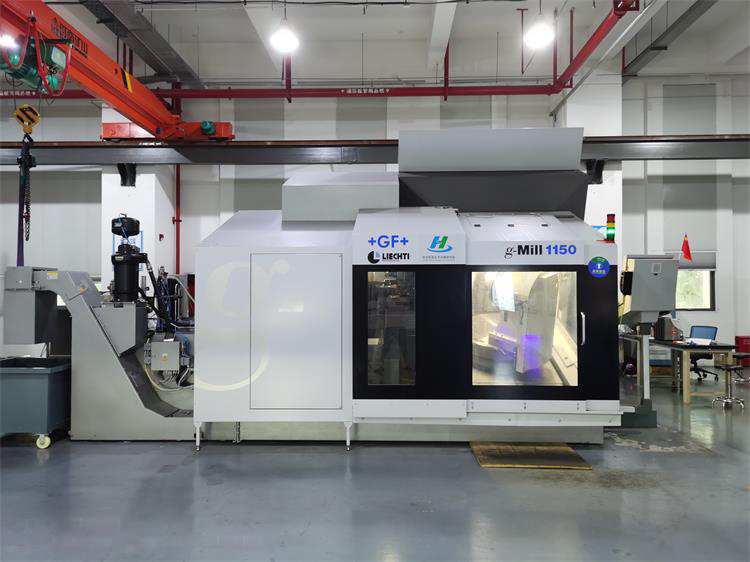 5-Axis Explanation You may already be familiar with 3-axis machining. If that‘s not the case, it‘s simple - it‘s a machine that moves laterally in the X axis, vertically in the Y axis, and back and forth in the Z axis. When working with 5-axis machining, you also have two axes: tilt table (A axis) and table rotation (C axis). Configuration for 5-axis machining Five-axis machines come in two main configurations: Rotary-rotary: These machines take advantage of the rotary axis by rotating the spindle. This style is great for machining heavier parts because the table is always horizontal. Trunnion style: Trunnion machines have a movable table, which is useful for machining large volumes because the spindle doesn‘t take up space. The specific type of machine used depends on various factors of your job, including the weight of the part and the number of finished products.
5-Axis Explanation You may already be familiar with 3-axis machining. If that‘s not the case, it‘s simple - it‘s a machine that moves laterally in the X axis, vertically in the Y axis, and back and forth in the Z axis. When working with 5-axis machining, you also have two axes: tilt table (A axis) and table rotation (C axis). Configuration for 5-axis machining Five-axis machines come in two main configurations: Rotary-rotary: These machines take advantage of the rotary axis by rotating the spindle. This style is great for machining heavier parts because the table is always horizontal. Trunnion style: Trunnion machines have a movable table, which is useful for machining large volumes because the spindle doesn‘t take up space. The specific type of machine used depends on various factors of your job, including the weight of the part and the number of finished products. 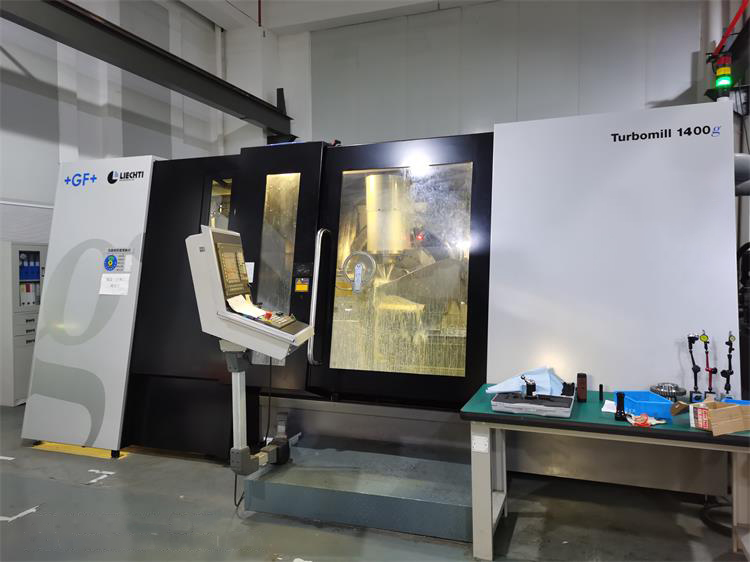 Why Choose 5-Axis CNC Machining If you are going to choose between 3D printing, 3 + 2-axis machining, or 5-axis machining, then there is no doubt that if quality and efficiency are important to you, you will choose 5-axis machining. Compare this process to the other two, like comparing a frozen turkey dinner to a Thanksgiving meal. This is why 5-axis machining is at the top of the list: 5-Axis vs. 3D Printing: The core difference between the two is that 5-axis is a subtractive process, while 3D printing is an additive process. When these two manufacturing methods work in harmony and complement each other, they are in excellent condition. You can‘t really use one process in place of another. If you have complex parts, a variety of materials, and a larger workload, then 5-axis will be a great choice for you. However, you may be able to take advantage of 3D printing to design certain parts. 5-Axis vs. 3 + 2-axis: It seems difficult to tell the difference between 3 + 2-axis machining and 5-axis machining. 3 + 2-axis machining (often called 5-axis indexing machining) requires stopping and starting when 5-axis machining is performed continuously. 5-axis machining is an easier and faster way to get the same or better results. While every manufacturing process has a time and place, 5-axis machining is the way to achieve high quality and great efficiency. Mastering the Art of Milling Although 5-axis machining has several advantages, such as increased efficiency, increased tool life and reduced lead times, these advantages cannot be enumerated one by one. To reap these benefits, you need the right people to set up the tools and oversee the process. To get the desired results, more than just machining parts is required. It requires proper training, personnel and communication. Achieving the Impossible When using 5-axis machining, parts that would otherwise seem impossible can be manufactured. With this process, you can milling, drilling and tapping multiple complex shapes in just one setup. Create any combination of complex shapes with just one setup. Whether you want a prototype or need to complete a large order, you can rely on Precision Tools to meet your needs with our 5-axis machining services. We will help you save time, save money and improve accuracy. Contact us to learn more about our 5-axis machining.
Why Choose 5-Axis CNC Machining If you are going to choose between 3D printing, 3 + 2-axis machining, or 5-axis machining, then there is no doubt that if quality and efficiency are important to you, you will choose 5-axis machining. Compare this process to the other two, like comparing a frozen turkey dinner to a Thanksgiving meal. This is why 5-axis machining is at the top of the list: 5-Axis vs. 3D Printing: The core difference between the two is that 5-axis is a subtractive process, while 3D printing is an additive process. When these two manufacturing methods work in harmony and complement each other, they are in excellent condition. You can‘t really use one process in place of another. If you have complex parts, a variety of materials, and a larger workload, then 5-axis will be a great choice for you. However, you may be able to take advantage of 3D printing to design certain parts. 5-Axis vs. 3 + 2-axis: It seems difficult to tell the difference between 3 + 2-axis machining and 5-axis machining. 3 + 2-axis machining (often called 5-axis indexing machining) requires stopping and starting when 5-axis machining is performed continuously. 5-axis machining is an easier and faster way to get the same or better results. While every manufacturing process has a time and place, 5-axis machining is the way to achieve high quality and great efficiency. Mastering the Art of Milling Although 5-axis machining has several advantages, such as increased efficiency, increased tool life and reduced lead times, these advantages cannot be enumerated one by one. To reap these benefits, you need the right people to set up the tools and oversee the process. To get the desired results, more than just machining parts is required. It requires proper training, personnel and communication. Achieving the Impossible When using 5-axis machining, parts that would otherwise seem impossible can be manufactured. With this process, you can milling, drilling and tapping multiple complex shapes in just one setup. Create any combination of complex shapes with just one setup. Whether you want a prototype or need to complete a large order, you can rely on Precision Tools to meet your needs with our 5-axis machining services. We will help you save time, save money and improve accuracy. Contact us to learn more about our 5-axis machining.


 Spanish
Spanish Arabic
Arabic Spanish Basque
Spanish Basque Portuguese
Portuguese Belarusian
Belarusian Japanese
Japanese Russian
Russian Icelandic
Icelandic Bulgarian
Bulgarian Azerbaijani
Azerbaijani Estonian
Estonian Irish
Irish Polish
Polish Persian
Persian Boolean
Boolean Danish
Danish German
German French
French Filipino
Filipino Finnish
Finnish Korean
Korean Dutch
Dutch Galician
Galician Catalan
Catalan Czech
Czech Croatian
Croatian Latin
Latin Latvian
Latvian Romanian
Romanian Maltese
Maltese Malay
Malay Macedonian
Macedonian Norwegian
Norwegian Swedish
Swedish Serbian
Serbian Slovak
Slovak Slovenian
Slovenian Swahili
Swahili Thai
Thai Turkish
Turkish Welsh
Welsh Urdu
Urdu Ukrainian
Ukrainian Greek
Greek Hungarian
Hungarian Italian
Italian Yiddish
Yiddish Indonesian
Indonesian Vietnamese
Vietnamese 简体中文
简体中文 Haitian Creole
Haitian Creole

